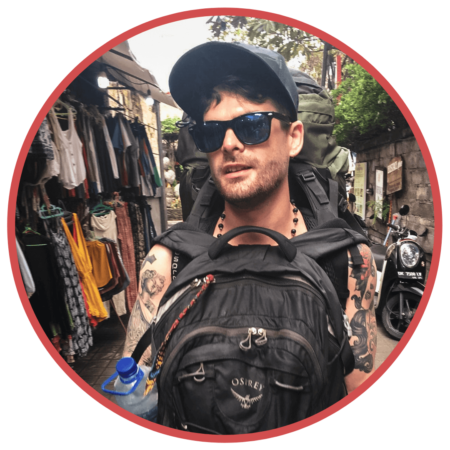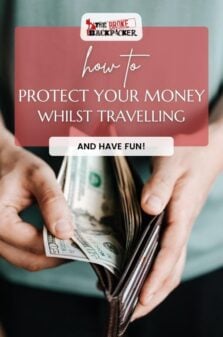There is a hell of a lot of advice out there about staying safe on your travels. Whether this is your Doctor advising you to get a tetanus booster shot, your Grandmother telling you to be wary of strangers of your governments travel advice department cautioning you about Ecuador’s “express kidnappings”, the plethora of info about personal safety can be pretty overwhelming.
Whilst most trips end happily and safely, the reality is that in a lot of places travelers are considered something of a target and occasionally they do fall foul of the few bad apples.
In this article, we will take a look at how you can protect your money whilst travel.
Protecting Your Good, Old Paper Money
Carry the Minimum Cash
First and foremost, the best thing you can do is to minimise how much cash you are carrying with you. By carrying as little cash as is possible you (1) make yourself less of an attractive target and (2) if you are robbed then you have minimized the damage.
These days, there is often no real need to carry loads of cash as ATM’s are ubiquitous and with Travel Cards and other Fin-Tech innovations, you can usually even save yourself ATM fees. However, carrying some cash is always going to be necessary especially in countries like Iran and Cuba where you can’t use your bank card. In these cases, work out how much you will need for accommodation and any tour costs, estimate your daily budget and then add 10% as leeway for emergencies.
Invest in a Money Belt
Getting a good money belt is pretty much rule 101 of not being robbed. A money belt functions like a normal belt except that it has a secret pouch on the inside where you discreetly hide your money. Just make sure that you don’t let anybody see you accusing it as this will give the game away.
A lot of robbers do know about money belts but usually, they don’t have the time or the means to make you take your belt of and instead will just go for your wallet.
Robers Tax
Firstly, always be vigilant for pickpockets especially in crowded places and never put your wallet in your back pocket which is dubbed “the mugs pocket” by the criminal class.
Then, keep only the minimum amount of money you need in the wallet with the bulk of it hidden inside your money belt. That way, if you are robbed then the assailant will think that the $10 “robbers tax” you have in your wallet is all you have.
Also, be sure not to keep all of your bank or credit cards in the same wallet. Losing one bank card is annoying but losing them all can mean you going hungry…
Hide Your Cash
Any cash you do carry should be well hidden. Carry only a little bit on your wallet to cover your daily, essential expenses.
Keep the rest of your money locked up and hidden back in your guesthouse. If it has a safe or a locker use it and even then, hide it.
Use your imagination here and utilize what you have available. A few favorite money hiding places of mine are inside the soul of a shoe and rolled up inside a torch or even waterproofed in a condom and then hidden inside a shampoo bottle – seriously, nobody will ever think to look in there.
Money Changers
The vast majority of money changers are pretty honest, even the unofficial ones who operate on street corners. However, there are plenty of travelers who will tell of being short-changed by money changers who fail to give them as much as they should. This is a particular risk when dealing you first encounter a new currency and when the said currency has a lot of 0’s.
Do you research before you set of? Investigate and familiarise yourself with the different notes and take some time to do the maths so you know how much you should be getting. Then, when you do change, take time to count it property and do not let anybody rush you.
Protecting Your Digital Money
But what is often overlooked, is the dangers that travelling can pose to your digital or online safety. Of course, whereas having your Identity stolen or accounts hacked may not physically harm you, it can mean your savings been stolen, credit profile ruined and can sometimes lead to wrongful arrest – and believe me, even a brief spell in a South American jail could be a matter of life and death!
Internet Cafe’s
Internet cafe’s are sadly a magnet for scammers. Firstly, all users in the cafe are using the same Network which makes it very easy to be hacked. Secondly, if you are using one of the cafe’s machines it could have been loaded with all manner of cyber software to record your passwords or even bank details.
The best way to protect yourself is by using your own device, with a good, reliable VPN (more below).
If you don’t have your own device and have to use on the house machines the sadly you are bit more vulnerable.
Get a VPN
A VPN, (virtual privacy network) has a number of uses. Firstly, it allows you to change your IP address so nobody can track you and it also makes it a lot harder for any hackers or phishing scammers to get to you.
Oh, and they are great for getting around Internet firewalls in censorship countries like Iran and China.
Watch For Malware
Before you leave, be sure to get yourself a good anti-virus and malware software. Getting a 2 in 1 is advisable as it will usually save you a significant amount of cash.
This will prevent scammers from installing trojans on your machine and will also protect against damaging, malicious commuter virus’.
ATM’s & Bank Cards
In order to minus the risk of having your bank card stolen or cloned I recommend you use a pre-paid travel credit card. You then top it up habitually from your main account. This means that if your card is stolen, cloned or if you are subject to an “express kidnapping”, then the only money you lose is whatever is on the card at that time rather than everything in your current account. This can mean the difference between being robbed of $100 or $1000.
Also, pre-prepaid travel cards are usually also incredible value as often they don’t charge any fees and offer great exchange rates.
Buy Us a Coffee!
A couple of you lovely readers suggested we set up a tip jar for direct support as an alternative to booking through our links. So we created one!
You can now buy The Broke Backpacker a coffee. If you like and use our content to plan your trips, it’s a much appreciated way to show appreciation 🙂
The Broke Backpacker is supported by you. Clicking through our links may earn us a small affiliate commission, and that's what allows us to keep producing free content 🙂 Learn more.







